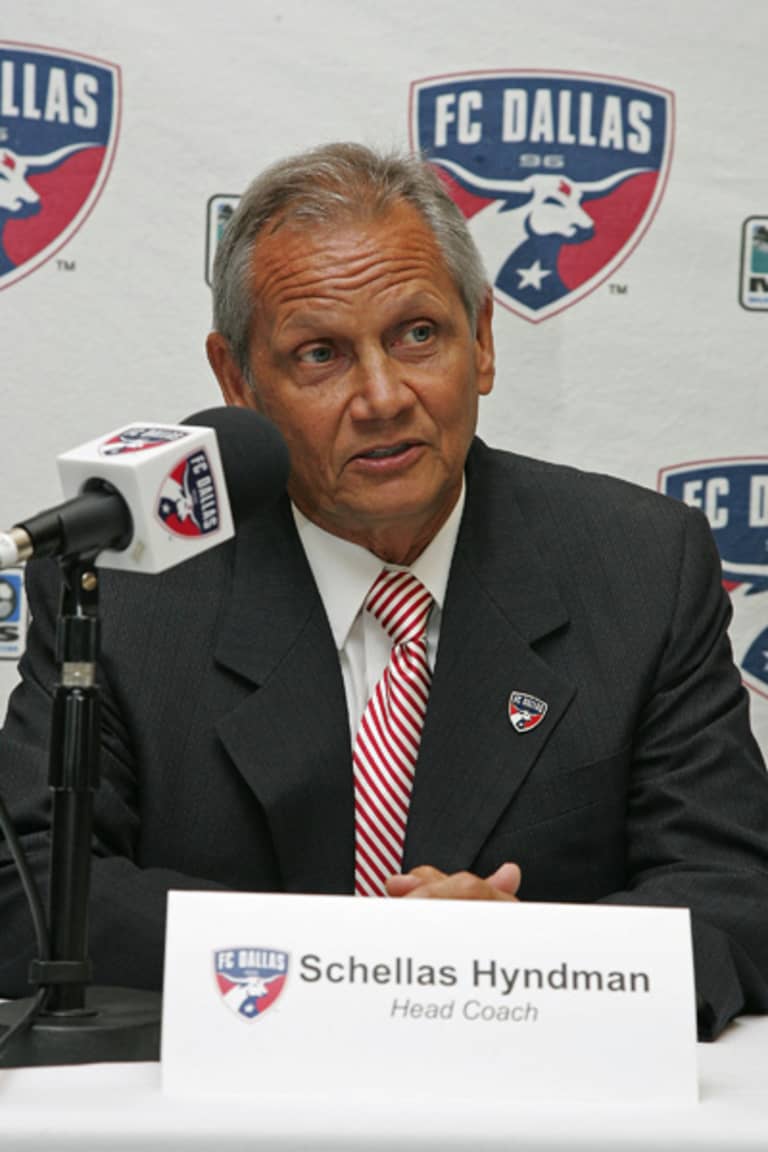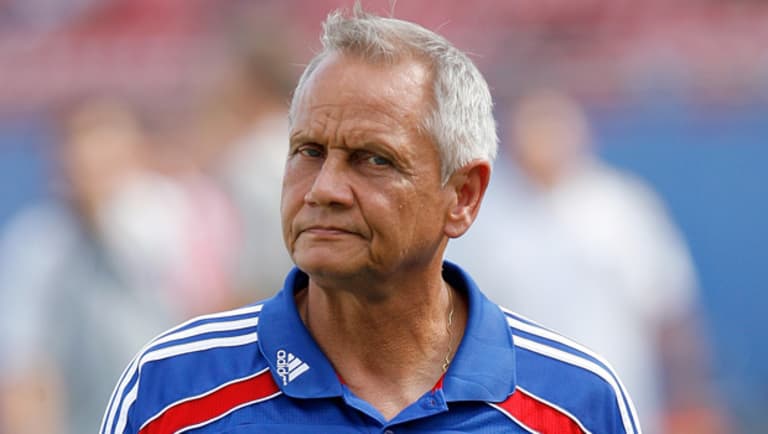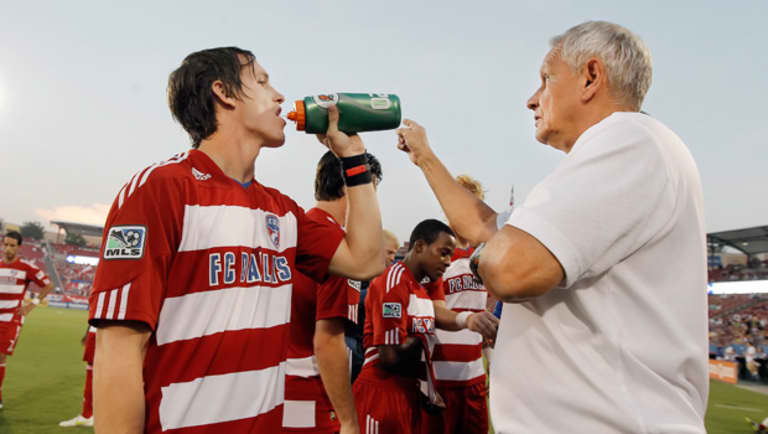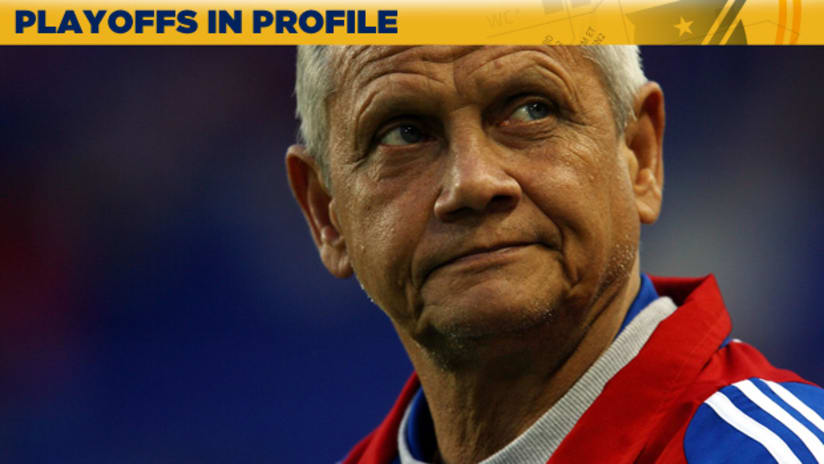As the MLS Cup playoffs get set to begin, the MLSsoccer.com series "Playoffs In Profile" will take a look at the players and personalities who will each play a crucial role in their teams' hopes of winning the MLS Cup.
The series debuts with MLSsoccer.com contributor John Bolster's look at FC Dallas head coach Schellas Hyndman, who leads the defending Western Conference champions back into the postseason with a mix of patience, leadership and a knack for getting physical when necessary. Check back with MLSsoccer.com to read the latest story as the "Playoffs in Profile" series continues during the wild-card round and conference semifinals.
We haven’t checked with Dos Equis, but it’s entirely possible that Schellas Hyndman was the inspiration for their signature character, “The Most Interesting Man in the World.”
That’s what they say in the FC Dallas locker room, and the more you learn about the fourth-year FCD coach, the more you believe it.
Hyndman speaks three langugages. He’s a born storyteller who frequently commands a room with spellbinding tales, according to Dallas midfielder Daniel Hernandez, who played for Hyndman at SMU from 1994-97.
In 31 years as a college coach at Eastern Illinois University and Southern Methodist University, Hyndman produced a record of 466-122-49. He was named national Coach of the Year in 1981 after leading Eastern Illinois to third place in the NCAA Tournament—in their first year as a Division I program.
Before launching his coaching career, Hyndman traveled to Brazil to do an estagio, a kind of internship, with the famed São Paulo Futebol Clube. He regularly returns to South America to shadow coaches, scout players and catch up with his extensive network of contacts down there.
In his home office, there’s a Brazil national team shirt autographed by none other than Pelé, who signed it for Hyndman right before he left Brazil to play for the New York Cosmos.
Oh, and did we mention Hyndman is a fifth-degree black belt in Aiki Jujitsu? It’s true. He once took care of two would-be carjackers with the nunchucks he kept in his Jeep at SMU.
Come to think of it, maybe the Dos Equis dude could learn a thing or two from Hyndman.
A New Frontier

In any event, one thing both interesting men would agree on is the need to get out of your comfort zone, and to push your boundaries. If not for that impulse, Hyndman would still be at SMU, where he had everything a college coach could want, including a lifetime contract.
“I could have been there for the next 10 years,” he says, “and never had to worry about a thing. I had the recruiting in place, I had respect; we were successful. But I never wanted to be on my deathbed and wish I had the courage to take this leap, and test myself.”
When FC Dallas came calling in the summer of 2008, Hyndman decided the time was right. He had the support of his family, he wouldn’t have to leave the Dallas community and he had every confidence in the ownership group headed by Clark and Dan Hunt.
Of course, there’s a difference between finding success at the college level and finding it in the pros—just ask Rick Pitino and Steve Spurrier, among others.
Was Hyndman ready to make that leap?
“Without a doubt,” says Hernandez. “I’ve been around a lot of coaches, professionally, in Mexico and here in the US, and even from my short time knowing him in college, I knew that he was one of the best coaches I’ve ever been around.”
Adds Ugo Ihemelu, FC Dallas center back who also played for Hyndman at SMU: “It is a really hard transition, and what he had at SMU was an unbelievable thing, but I knew that if [succeeding at the pro level] was what he really wanted, then he would be able to accomplish it.”
After taking over for Steve Morrow in June 2008, Hyndman saw out that season with an 8-10-12 record, then set about molding the team he wanted.
“It’s a very attractive style of soccer that he brings to the table,” says Hernandez. “And the most important thing, beside the knowledge of the game that he has, is the way he’s able to manage the different players and personalities. He’s such a business-minded guy that he’s able to manage those things on and off the field very well.”
Adds Ihemelu, “He has an eye for finding players he likes and organizing them into a cohesive team. He focuses on creating team chemistry, because he knows that’s very important. He’s aware that you can put a bunch of talented players together, but if they don’t click, they’re never going to succeed.”
Success didn’t take long. In 2009, his first full season with the team, Dallas finished seventh in the Western Conference and missed the playoffs. The following year, they lost just four games, finished third in a very competitive West, and went all the way to the franchise’s first-ever MLS Cup final, narrowly losing to Colorado.
Tough Character
But take a quick glance at Hyndman’s background and you see a man seasoned for success.
He was born in Macau — the formerly Portuguese territory surrounded by mainland China — to a Portuguese father and a Russian-French mother. With his light hair and light eyes, he “didn’t fit in with the world” there, and started having trouble in the schoolyard. So his father enrolled him in some local martial arts classes. Little did he know he was embarking on a lifelong journey.
When the communist revolution next door in China spilled across the border and made life dangerous for the Hyndmans, they fled Macau in the cargo hold of a ship, eventually settling in Ohio. Once again, Hyndman was an outsider, and he continued his martial arts education, KarateKid–style:

“I got to the point where we didn’t have any more money for lessons,” Hyndman remembers. “So the instructor had me clean the Dojo, paint, all those type of things, because he really found something in me that he wanted to continue to develop.”
Hyndman practices Combat Ki and Aiki Ju Jutsu to this day, and there’s some proof of his mastery online. The YouTube clip showing Hyndman getting kicked in the groin by a SMU football player (the technique on display, he says, is generating “internal energy” to protect the body) is impossible not to enjoy, and equally impossible not to respect.
Martial arts are a way of life for Hyndman now, yet he keeps them separate from his soccer career. But there are stories. Ihemelu related the one about the two guys who tried to steal Hyndman’s Jeep.
“Oh, these stories get bigger and bigger and bigger,” says Hyndman, laughing. “Did he say one guy was Godzilla and the other was King Kong?”
Pressed to confirm the legend, Hyndman says it’s true.
“I was training in martial arts five nights a week and going four hours a night,” he said. “Here I am in my open Jeep, and a couple guys come up. They’re going to try to take my Jeep from me. So, yeah, I happened to carry a set of nunchuks with me and ... let’s put it this way: I was able to drive my Jeep home.”
A Learning Moment
That’s the kind of confidence that proved useful for FC Dallas this season. The club lost 2010 MVP David Ferreira to a severe ankle injury in April, putting a large obstacle in their path back to the MLS title game.
Of the team talk in the locker room that day, Hyndman says, “I had to be careful with what I said, because if I said something they weren’t going to buy, then it was going to be a wasted opportunity.”
Notice how he sees the opportunity in the potentially devastating event—a trademark of Hyndman’s belief in the power of positive thinking.
Indeed, the way he handled the situation illustrates what he’s about as a coach, and a person—honest, resourceful, positive, with strong leadership skills. He used the material at hand, namely the Vancouver game in which Ferreira was injured: Despite losing their playmaker, Dallas came back and won the game.
“I told them, ‘We didn’t just lose a player—we lost the MVP of the league. And we came back and we won that game. One of the reasons was because you guys stepped up. You knew David wasn’t on the field and you knew you had to step up and do more.’ ”

There it was—the way forward for the rest of the season: “What that tells me,” Hyndman continued that day, “is that if we as a team—if every player just improves himself five percent—we can still have a successful season.”
Here they are, six months later, hosting a wild-card game in the playoffs on Wednesday against the New York Red Bulls (9 pm ET, Fox Soccer/TSN2). They’re not a top seed in the West, but they’re in the postseason, with a puncher’s chance of getting back to the title game.
“I think this year has shown exactly what type of coach he is,” says Hernandez. “We played most of the year without a true attacking forward. But he did a great job of keeping us positive, and he shifted guys around. We had a lot of success just by Schellas knowing where to put players to get the most out of them.”
And that’s been perhaps Hyndman’s biggest strength during his career, getting the most of what he can from the men he’s chosen and the team he’s helped build.
It’s a simple formula that’s worked for years, and it’s not about to change now: keep it focused, keep it simple, and as always, keep it interesting.













